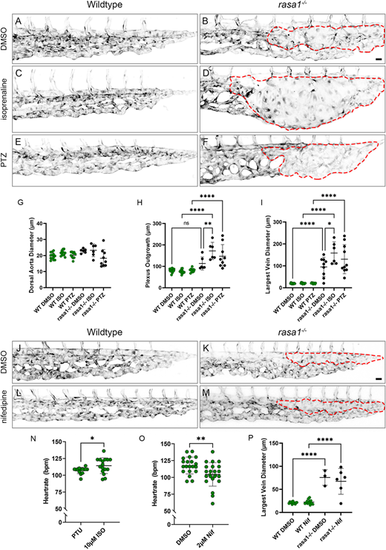Fig. 4
- ID
- ZDB-FIG-231227-33
- Publication
- Greysson-Wong et al., 2023 - rasa1-related arteriovenous malformation is driven by aberrant venous signalling
- Other Figures
- All Figure Page
- Back to All Figure Page
|
Modulation of flow does not rescue rasa1−/− malformations. (A-F) Confocal images of wild type and rasa1−/− on Tg(kdrl:EGFP) (black) when treated with DMSO, isoprenaline (iso) and phenylhydrazine (PTZ). Vascular malformations are outlined with a red dashed line. (G) Quantification of dorsal aorta diameter shows no significant difference between wild types and rasa1−/− with either drug [WTDMSO (n=13) versus rasa1−/−DMSO (n=9), P=0.19; WTiso versus rasa1−/−iso (n=6), P=0.88; WTPTZ versus rasa1−/−PTZ (n=10), P=0.74; N=3 experiments]. (H) Plexus outgrowth in wild type and rasa1−/− is significantly larger than wild types (WTDMSO versus rasa1−/−DMSO, P=0.21; WTiso versus rasa1−/−iso, P<0.0001; WTPTZ versus rasa1−/−PTZ, P<0.0001; N=3 experiments). Isoprenaline appears to increase plexus outgrowth when compared with untreated rasa1−/−DMSO (P=0.0086). (I) Increased largest vein diameter is not rescued in rasa1−/− upon either increasing or decreasing blood flow (WTDMSO versus rasa1−/−DMSO, P<0.0002; WTiso versus rasa1−/−iso, P<0.0001; WTPTZ versus rasa1−/−PTZ, P<0.0001, N=3 experiments). (J-M) Confocal images of wild type and rasa1−/− on Tg(kdrl:EGFP) (black) when treated with DMSO and nifedipine (nif). No treatments rescue rasa1−/− malformations. (N) Heart rate of wild-type embryos treated with isoprenaline increased by 6.6% [wild type, 177.1 bpm (n=14); WTiso, 114.2 bpm (n=16), P=0.0024; N=4 experiments]. (O) Heart rate of wild-type embryos treated with nifedipine decreased by 11.2% [WTDMSO, 117.7 bpm (n=20); WTnif, 104.5 bpm (n=23); P=0.0074; N=4 experiments]. (P) Quantification of largest vein diameter in wild types and rasa1−/− treated with DMSO and nifedipine [WTDMSO (n=12) versus rasa1−/−DMSO (n=3); P<0.0001; WTnif (n=13) versus rasa1−/−nif (n=6); P<0.0001, N=4 experiments]. Statistical analysis was carried out using one-way ANOVA with Sidak's correction for drug experiments. An unpaired t-test was used for heart rate analysis. Data are mean±s.d. Scale bars: 20 µm. |

